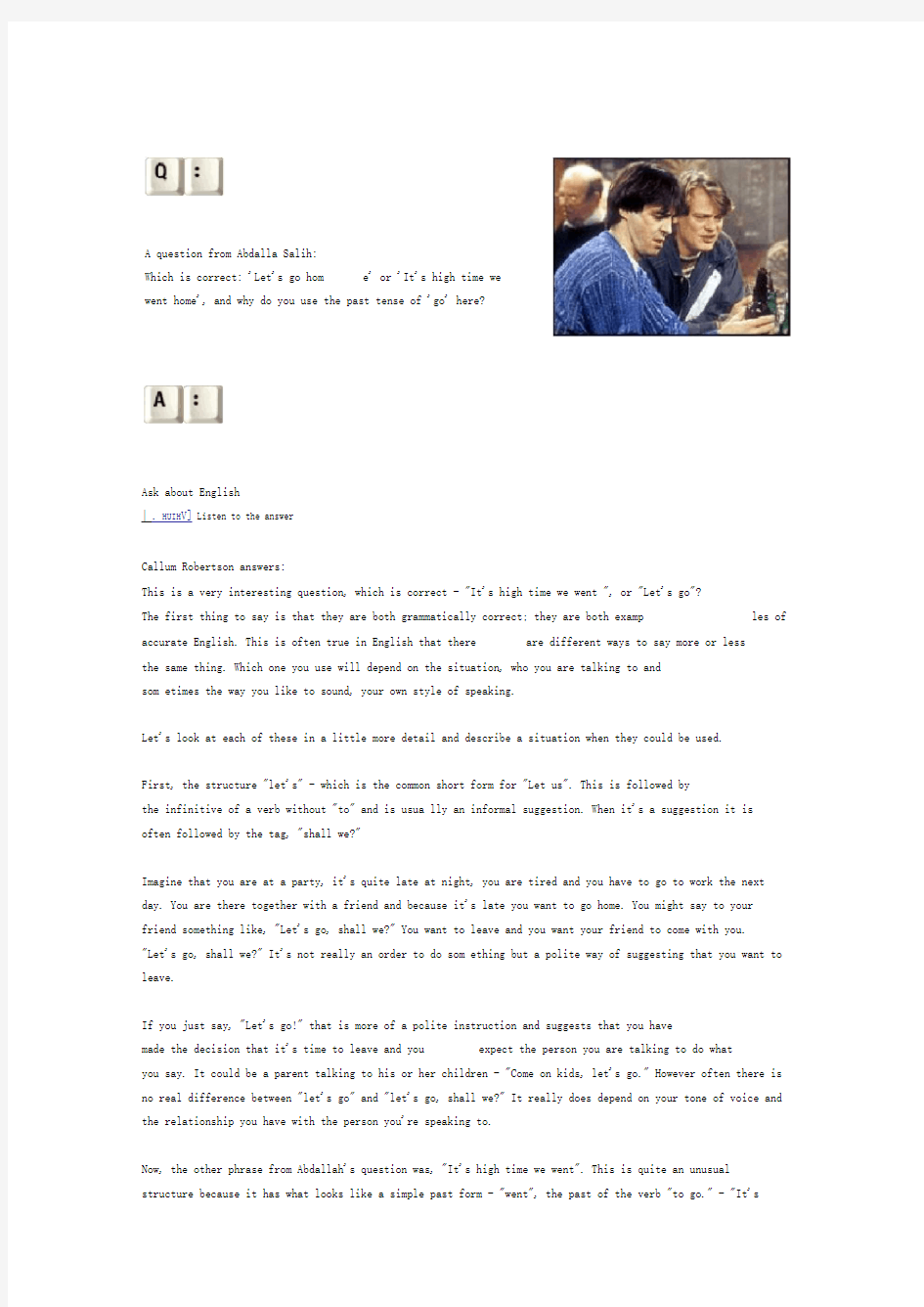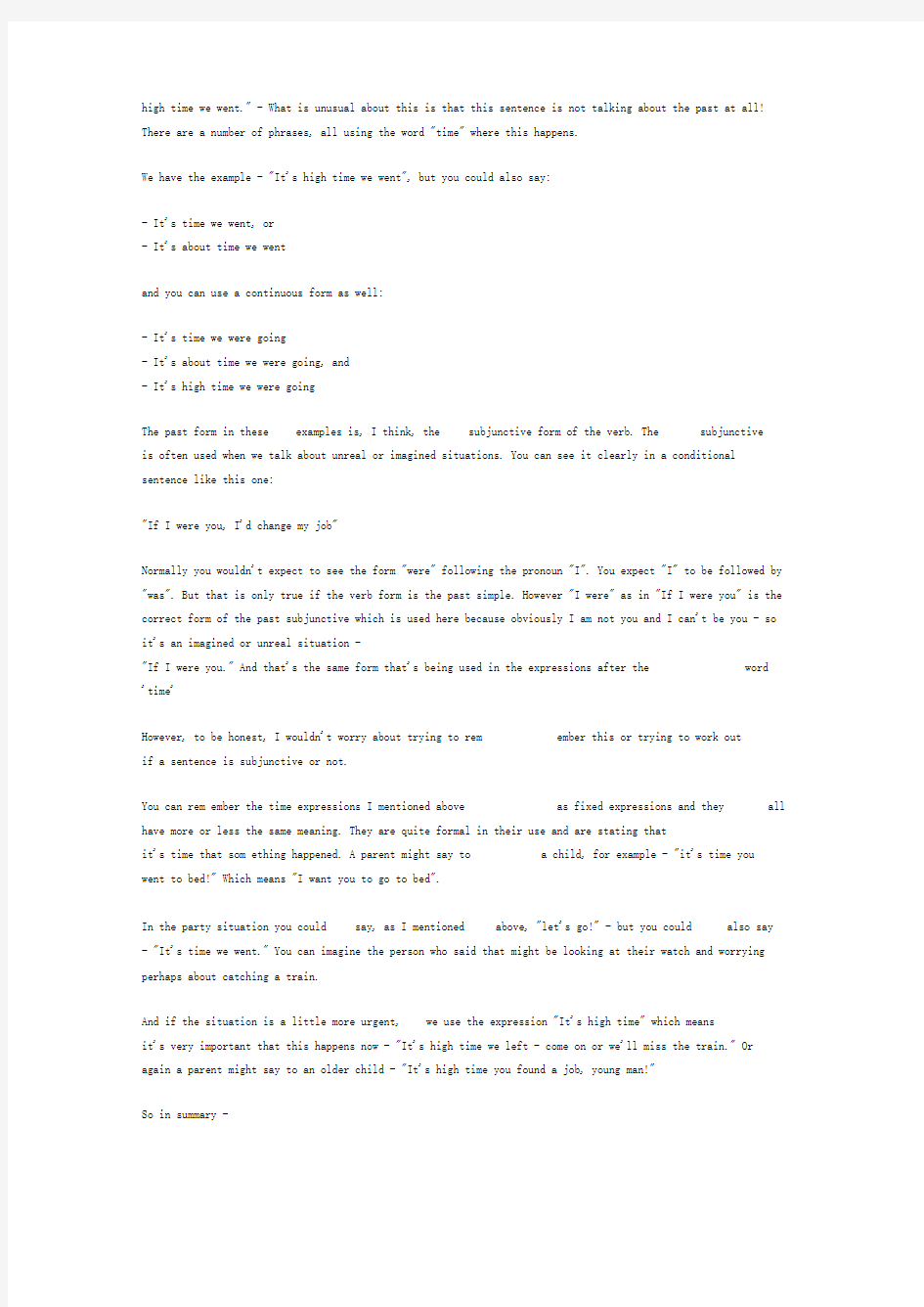

A question from Abdalla Salih:
Which is correct: 'Let's go hom e' or 'It's high time we
went home', and why do you use the past tense of 'go' here?
Ask about English
|. HUIH V]Listen to the answer
Callum Robertson answers:
This is a very interesting question, which is correct - "It's high time we went ", or "Let's go"?
The first thing to say is that they are both grammatically correct; they are both examp les of accurate English. This is often true in English that there are different ways to say more or less
the same thing. Which one you use will depend on the situation, who you are talking to and
som etimes the way you like to sound, your own style of speaking.
Let's look at each of these in a little more detail and describe a situation when they could be used.
First, the structure "let's" - which is the common short form for "Let us". This is followed by
the infinitive of a verb without "to" and is usua lly an informal suggestion. When it's a suggestion it is
often followed by the tag, "shall we?"
Imagine that you are at a party, it's quite late at night, you are tired and you have to go to work the next day. You are there together with a friend and because it's late you want to go home. You might say to your friend something like, "Let's go, shall we?" You want to leave and you want your friend to come with you.
"Let's go, shall we?" It's not really an order to do som ething but a polite way of suggesting that you want to leave.
If you just say, "Let's go!" that is more of a polite instruction and suggests that you have
made the decision that it's time to leave and you expect the person you are talking to do what
you say. It could be a parent talking to his or her children - "Come on kids, let's go." However often there is no real difference between "let's go" and "let's go, shall we?" It really does depend on your tone of voice and the relationship you have with the person you're speaking to.
Now, the other phrase from Abdallah's question was, "It's high time we went". This is quite an unusual
structure because it has what looks like a simple past form - "went", the past of the verb "to go." - "It's
high time we went." - What is unusual about this is that this sentence is not talking about the past at all! There are a number of phrases, all using the word "time" where this happens.
We have the example - "It's high time we went", but you could also say:
- It's time we went, or
- It's about time we went
and you can use a continuous form as well:
- It's time we were going
- It's about time we were going, and
- It's high time we were going
The past form in these examples is, I think, the subjunctive form of the verb. The subjunctive
is often used when we talk about unreal or imagined situations. You can see it clearly in a conditional sentence like this one:
"If I were you, I'd change my job"
Normally you wouldn't expect to see the form "were" following the pronoun "I". You expect "I" to be followed by "was". But that is only true if the verb form is the past simple. However "I were" as in "If I were you" is the correct form of the past subjunctive which is used here because obviously I am not you and I can't be you - so it's an imagined or unreal situation -
"If I were you." And that's the same form that's being used in the expressions after the word
'time'
However, to be honest, I wouldn't worry about trying to rem ember this or trying to work out
if a sentence is subjunctive or not.
You can rem ember the time expressions I mentioned above as fixed expressions and they all have more or less the same meaning. They are quite formal in their use and are stating that
it's time that som ething happened. A parent might say to a child, for example - "it's time you
went to bed!" Which means "I want you to go to bed".
In the party situation you could say, as I mentioned above, "let's go!" - but you could also say - "It's time we went." You can imagine the person who said that might be looking at their watch and worrying perhaps about catching a train.
And if the situation is a little more urgent, we use the expression "It's high time" which means
it's very important that this happens now - "It's high time we left - come on or we'll miss the train." Or again a parent might say to an older child - "It's high time you found a job, young man!"
So in summary -
"Let's go" is an informal suggestion or a polite instruction -
"It's high time" - is a formal statement that it is important that something happen soon or that something happen now.
And now - it's about time I finished this answer.